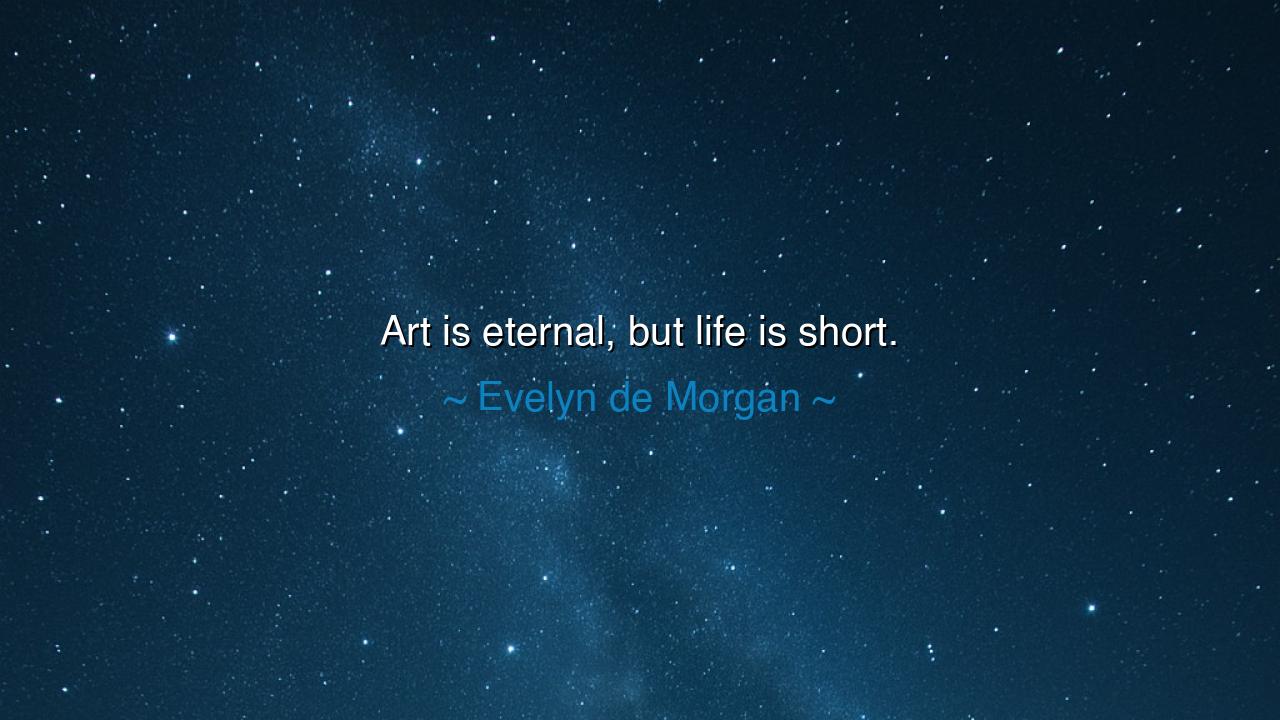
Art is eternal, but life is short.






Host: The soft glow of the candlelight flickered as Jack and Jeeny sat in the quiet corner of the room, the words of Evelyn de Morgan hanging in the air between them. The simplicity of the quote—“Art is eternal, but life is short”—carried a deep, almost haunting resonance. Outside, the world moved with its usual rhythm, but inside, their conversation had taken a more reflective turn.
Jack: “You know, Evelyn de Morgan’s words about art being eternal while life is so fleeting really hit me. Art, in a way, transcends time. It outlives us, it captures pieces of history, emotions, and stories that we might never get to see fully realized in our own lives. But then there’s the harsh truth that our lifetime is so short, so fragile. It’s like art gives us a chance to immortalize what we can’t hold onto ourselves.”
Jeeny: “It’s powerful, isn’t it? Art is this timeless vessel, capturing the essence of what it means to be human, of moments that are fleeting and yet universal. The life we experience is so brief, but art—whether through paintings, music, literature, or sculpture—captures these moments and preserves them, giving us a sense of immortality. It’s like we’re creating something that speaks beyond the limits of our own lives.”
Jack: “Right. And I think that’s part of the beauty of it. Art is a way to make sense of the chaos and transience of life. While we might not have control over how long we’re here or what happens in the future, through art, we get to create something that can potentially last forever. It’s a kind of legacy, not just for the artist, but for all who experience it, across generations.”
Jeeny: “Yes, and it’s not just about immortality, but about connection. Art lets us touch on emotions, experiences, and ideas that go beyond time. Even if life is short, through art, we find ways to communicate that feel eternal. Think about all the artists, writers, and musicians who came before us—their work still resonates with us, centuries later. It’s a kind of bridge, connecting people from different times and places.”
Jack: “I see what you mean. It’s like we’re contributing to a conversation that goes on forever. Our time here is limited, but what we create has the potential to reach beyond those boundaries. And that’s why art can feel so powerful—it gives us a way to keep part of ourselves, part of our experiences, alive in a way that life itself can’t. Even when we’re gone, our art can continue to speak.”
Jeeny: “Exactly. It’s both humbling and inspiring. Art allows us to make a mark on the world in a way that transcends time. It’s a gift to the future and a reminder to the past of what was once felt, seen, and experienced. We might only be here for a short while, but through art, we eternally exist in the emotions and minds of others. That’s the power of creation.”
Host: The soft murmur of the world outside seems distant now, as the conversation between Jack and Jeeny settles into a gentle rhythm. The idea that art is eternal, that through creation we capture pieces of ourselves for eternity, resonates deeply. In a world where life is short and unpredictable, perhaps the greatest legacy we can leave is what we create—the stories, the emotions, and the beauty that will endure long after we’re gone.






AAdministratorAdministrator
Welcome, honored guests. Please leave a comment, we will respond soon